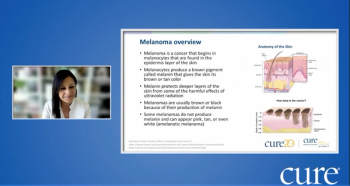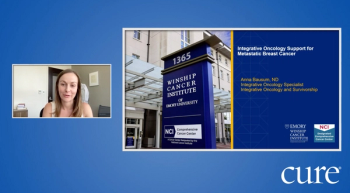
Although patients treated with the combination did not have significant improvements in survival, telaglenastat and Cabometyx did not increase the rate of side effects in patients.

Colleen Moretti, Assistant Editor for CURE®, joined MJH Life Sciences in November 2020. Colleen is a graduate of Monmouth University, where she studied communication with a focus in journalism and public relations. In her free time, she enjoys learning to cook new meals, spending time with her adopted beagle, Molly, or sitting on the beach with a good book. Email her at [email protected]

Although patients treated with the combination did not have significant improvements in survival, telaglenastat and Cabometyx did not increase the rate of side effects in patients.

Long-term outcomes from this trial confirm the benefit of treatment with chemoradiotherapy over chemotherapy alone for patients with muscle-invasive bladder cancer.

Compared with gemcitabine, a modified FOLFIRINOX regimen improved survival rates over five years of follow-up for patients with pancreatic ductal adenocarcinoma who underwent resection, although all patients may not be suitable for this treatment, an expert said.

Compared to physician’s choice of treatment, Trodelvy improved survival and quality of life in pretreated patients with HR positive/HER2 negative metastatic breast cancer.

The time after cancer treatment can be overwhelming, but great progress in survivorship care plans over the past two decades has provided better guidance for an easier transition.

It is important for cancer survivors to know their risk of developing heart disease, even years after treatment has ended, as they may be underdiagnosed or undertreated for them.

Some cancer survivors might not have had the opportunity to preserve fertility prior to cancer treatment, leaving them unable to family plan.

One cancer survivor describes how making healthier choices in diet and exercise has improved her quality of life and relationship with others.

Researchers developed an artificial intelligence algorithm to potentially improve the prediction of colon cancer recurrence, which may help patients receive the appropriate treatment.

Many participants enrolled in the CRC-PREVENT trial are from communities often underrepresented in clinical trials due to gender, race and socioeconomic status, among other factors.

The FDA has allowed the manufacturer of emavusertib to continue a phase 1/2 study investigating effects of the treatment in patients with lymphoma.

If approved, the Lynparza-based regimen would become the first combination of a PARP inhibitor and a hormonal agent for metastatic castration-resistant prostate cancer.

The use of Trodelvy was associated with a significant improvement in survival when compared with physician’s choice of chemotherapy in patients with HR-positive, HER2-negative metastatic breast cancer, according to recently announced study findings.

After findings from an early-phase trial showed that the novel drug was associated with anti-tumor activity, investigators decided to continue enrolling more patients with ER-positive, HER2-negative metastatic breast cancer.

Data from a clinical trial demonstrate a “clear clinical benefit” of using a CAR-T cell therapy in patients with multiple myeloma, according to the drugs manufacturer.

Findings from a recently published study demonstrated that only a small percentage of women — all with breast cancer — who received silicone breast implants underwent the recommended screening to assess for potential ruptures.

Treatment with primary radiotherapy was linked to an increased risk for the development of secondary primary cancers among a large group of men with localized prostate cancer, according to recent study findings.

With society entrenched in an “infodemic,” it can be challenging for many patients with cancer to identify what information online is accurate. Recently, the development of a new tool may help patients decipher what news is misleading.

Here is a breakdown of some of the important information surrounding uveal melanoma, an extremely rare form of cancer.

Watch Dr. Terrance M. Williams, from City of Hope, discuss radiation advances during the CURE Educated Patient Lung Cancer Summit.

Watch Dr. Farhard Mazdisnian, from City of Hope, discuss diagnosing early, locally advanced and metastatic disease, during the CURE Educated Patient Lung Cancer Summit.

Watch Lorenzo G. Cohen, from The University of Texas MD Anderson Cancer Center, discuss integrative care during the CURE Educated Patient Skin Cancer Summit.

Watch Dr. Nicholas Sanfilippo, from Weill Cornell Medicine, discuss radiation therapy options during the CURE Educated Patient Skin Cancer Summit.

Watch Dr. Sunandan Chandra, from Northwestern University Feinberg School of Medicine, discuss the basics of melanoma, during the CURE Educated Patient Skin Cancer Summit.

The priority review comes following positive clinical trial results, which may lead to a shift in the treatment paradigm for follicular lymphoma, according to an expert.

Watch Dr. Wendy Baer, from Winship Cancer Institute at Emory University, discuss psychosocial issues, during the CURE Educated Patient Metastatic Breast Cancer Summit.

Watch Dr. Anna Bausum, Winship Cancer Institute at Emroy University, discuss alternative medicine, during the CURE Educated Patient Metastatic Breast Cancer Summit.

Receiving a diagnosis of metastatic breast cancer that has spread to the brain can be a frightening time for patients, however a new resource may help guide them through the stressful journey.

Cancer treatment has evolved over the past 20 years, but has the way it is depicted in television and movies also changed?

It is incredibly important that patients with MPNs inform their health care team of any symptoms they are experiencing, according to an expert from The Mays Cancer Center at UT Health San Antonio MD Anderson Cancer Center.